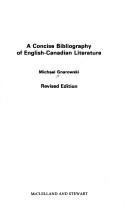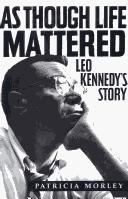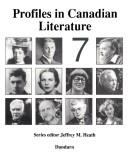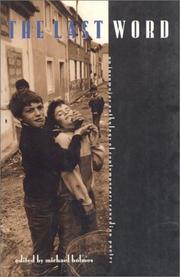| Listing 1 - 10 of 188 | << page >> |
Sort by
|
Periodical
Publisher: Waterloo, Ont. : Dept. of English, Waterloo Lutheran University.
Abstract | Keywords | Export | Availability | Bookmark
 Loading...
Loading...Choose an application
- Reference Manager
- EndNote
- RefWorks (Direct export to RefWorks)

ISBN: 0771033621 Year: 1978 Publisher: Toronto : McClelland and Stewart,
Abstract | Keywords | Export | Availability | Bookmark
 Loading...
Loading...Choose an application
- Reference Manager
- EndNote
- RefWorks (Direct export to RefWorks)
Canadian literature --- Littérature canadienne --- Bibliography --- Bibliographie --- -Canadian literature (English)

ISBN: 1282856774 9786612856778 0773564489 9780773564480 0773511474 9780773511477 Year: 1994 Publisher: Montreal : McGill-Queen's University Press,
Abstract | Keywords | Export | Availability | Bookmark
 Loading...
Loading...Choose an application
- Reference Manager
- EndNote
- RefWorks (Direct export to RefWorks)
Born of Irish immigrant stock, Kennedy earned his own living from the age of fourteen after his formal education ended at Grade Six. In a circle of privilege, he was the outsider. Despite this, his intelligence, imagination, and wit, coupled with an intense love of language and learning, opened many doors. Kennedy's choices in religion, friendship, marriage, and business were deeply influenced by the same yearning for justice and defence of humane values that informed his verse, stories, and essays. A successfully published poet at the age of 26 (The Shrouding, 1933), Kennedy soon left his literary world for that of the emerging business of advertising in order to support his family during the Depression. Acknowledging Kennedy's tendency to embroider the facts of his life a tendency rooted in the same talent that made him an important poet and an extremely successful advertising copywriter in corporate America Patricia Morley traces the roots of Kennedy's preoccupations and the development of his art from his birth in Liverpool in 1907 to his self-described "exile" in the United States. His return to Canada in 1976 brought renewed public recognition of his place among the "Montreal Poets." Kennedy experienced culture shock, yet he thrived and, in blackly comic letters, raged against the youth culture of his grandsons and the ironies of aging. With sympathy and insight into the vulnerability of genius, Morley catches the triumph of a most unusual life and restores a forgotten writer to his rightful place.
Canadian literature. --- Canadian literature (English) --- English literature --- Kennedy, Leo.

ISBN: 177070065X 1281962074 9786611962074 1554882699 9781554882694 1550021451 9781550021455 Year: 1991 Publisher: Toronto [Ont.] Dundurn Press
Abstract | Keywords | Export | Availability | Bookmark
 Loading...
Loading...Choose an application
- Reference Manager
- EndNote
- RefWorks (Direct export to RefWorks)
Canadian literature --- Canadian literature (English) --- English literature --- History and criticism.

ISBN: 1280910186 9786610910182 1459308697 1897414080 9781897414088 1895837324 9781895837322 Year: 1995 Publisher: Insomniac Press
Abstract | Keywords | Export | Availability | Bookmark
 Loading...
Loading...Choose an application
- Reference Manager
- EndNote
- RefWorks (Direct export to RefWorks)
The Last Word is a snapshot of the next generation of Canadian poets -- a true reflection of the '90s. The anthology brings together 51 poets from across Canada, reaching into different regional, ethnic, sexual and social groups. This varied and volatile collection pushes the notion of an anthology to its limits. Proceeds from the sale of The Last Word will support literacy programs across Canada.
Canadian poetry --- Canadian literature. --- Canadian literature (English) --- English literature
Book
ISBN: 198844912X 9781988449128 9781927494844 1927494842 Year: 2016 Publisher: Toronto, Ontario, Canada
Abstract | Keywords | Export | Availability | Bookmark
 Loading...
Loading...Choose an application
- Reference Manager
- EndNote
- RefWorks (Direct export to RefWorks)
Canadian literature --- History and criticism. --- Canadian literature (English) --- English literature
Periodical
Abstract | Keywords | Export | Availability | Bookmark
 Loading...
Loading...Choose an application
- Reference Manager
- EndNote
- RefWorks (Direct export to RefWorks)
Canadian literature --- Canadian literature (English) --- Littérature canadienne-anglaise --- 2000-2099
Periodical
Year: 1987 Publisher: [Saint-Laurent, Quebec] : [Black Writers' Guild],
Abstract | Keywords | Export | Availability | Bookmark
 Loading...
Loading...Choose an application
- Reference Manager
- EndNote
- RefWorks (Direct export to RefWorks)
Canadian literature --- Canadian Literature (English) --- Canadian literature (English) --- Littérature canadienne-anglaise --- Canadian literature. --- Black authors --- History and criticism --- Auteurs noirs --- Histoire et critique --- Black authors. --- 1900-1999
Periodical
Year: 1987 Publisher: [Saint-Laurent, Quebec] : [Black Writers' Guild],
Abstract | Keywords | Export | Availability | Bookmark
 Loading...
Loading...Choose an application
- Reference Manager
- EndNote
- RefWorks (Direct export to RefWorks)
Canadian literature --- Canadian Literature (English) --- Canadian literature (English) --- Littérature canadienne-anglaise --- Black authors --- History and criticism --- Auteurs noirs --- Histoire et critique --- 1900-1999
Book
ISBN: 1771120304 1771120312 1771120290 9781771120302 9781771120319 Year: 2015 Publisher: Waterloo, Ontario
Abstract | Keywords | Export | Availability | Bookmark
 Loading...
Loading...Choose an application
- Reference Manager
- EndNote
- RefWorks (Direct export to RefWorks)
In The Forest of Bourg-Marie, originally published in 1898, Toronto author and musician S. Frances Harrison draws together a highly mythologized image of Quebec society and the forms of Gothic literature that were already familiar to her English-speaking audience. It tells the story of a fourteen-year-old French Canadian who is lured to the United States by the promise of financial reward, only to be rejected by his grandfather upon his return. In doing so, the novel offers a powerful critique of the personal and cultural consequences of emigration out of Canada. In her afterword, Cynthia Sugars considers how The Forest of Bourg-Marie reimagines the Gothic tradition from a settler Canadian perspective, turning to a French-Canadian setting with distinctly New-World overtones. Harrison’s twist on the traditional Gothic plotline offers an inversion of such Gothic motifs as the decadent aristocrat and ancestral curse by playing on questions of illegitimacy and cultural preservation.
English Literature --- English --- Languages & Literatures --- Canadian literature. --- Canadian literature (English) --- English literature --- Canadian literature --- 19th century.
| Listing 1 - 10 of 188 | << page >> |
Sort by
|

 Search
Search Feedback
Feedback About UniCat
About UniCat  Help
Help News
News